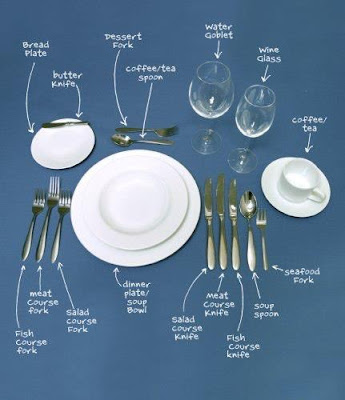The names of meals and mealtimes in Britain is often very confusing to anyone visiting Britain or Ireland.
Breakfast (aka brekkie)
The most important meal of the day, they say. The classic ‘
full English
breakfast’ can include eggs, bacon, sausages, baked beans, fried
tomatoes and mushrooms, and sometimes a slice of blood sausage called
‘black pudding’. As if that’s not enough, it usually comes with toast
and butter, fried bread or hash browns (a fried potato cake) – or even,
occasionally, chips (French fries).
Of course, most people in the UK don’t eat a ‘full English’ every day. It’s usually served as
brunch, a meal that covers
breakfast and lunch together and that tends to be a weekend treat.
On a working day,
most people eat cereal with milk, toast with jam or
honey, or porridge – a bowl of hot oats cooked in milk. The traditional
way to eat porridge is with salt, but many people prefer honey, brown
sugar or syrup, or pieces of fruit. More than half of Brits say they
start their day with a bowl of porridge – it’s healthy and it keeps you
going until lunch!
Elevenses
This is an old-fashioned name for your
mid-morning snack. Paddington
Bear – the famous English children’s book character – always had
marmalade sandwiches at 11am. Winnie the Pooh liked honey on his.
For others, nothing beats the hunger pangs like a cup of tea and a couple of biscuits.
Lunch
On most days, people in the UK eat a light, quick lunch – such as a sandwich, soup or salad – at some time between 12 and 2pm.
Lots of cafés and restaurants do special lunch deals, and you might
see ‘meal deals’ in supermarkets, where you can buy a drink, a sandwich
and a bag of crisps (potato chips) at a discount.
Sunday lunch – also called
'Sunday roast' because the main dish is
roasted – is the classic, big meal at the weekend, and can be served as
late as 5pm.
‘Dinner’ usually means the evening meal, which most people eat between
6pm and 9pm, with their family or friends. A ‘dinner date’ is a classic
way of getting to know someone better in a romantic restaurant.
 |
| Sunday roast |
However, some people say ‘dinner’ to describe lunch – especially a cooked lunch served in a school or work canteen.
Tea
Yes, tea is the classic British drink – but it’s also an afternoon
snack, like the mid-afternoon version of ‘elevenses’, and another word
for the evening meal too. Confused?
Let’s start with
‘afternoon tea’, which finds its home in ‘tearooms’,
particularly in seaside towns. This is usually served as a pot of tea
with a selection of small sandwiches, pastries and cakes arranged on a
tiered cake stand.
 |
| Afternoon tea |
A
‘cream tea’, particularly in Cornwall, includes
scones – sweet bread rolls, sometimes with raisins or sultanas, served
with butter, jam and a very thick cream called clotted cream.
But then some people call their evening meal ‘tea’ instead of ‘dinner’ – especially in northern parts of England.
Supper
There are also people who call the
evening meal ‘supper’. Supper tends
to be served a bit later (between 7.30pm and 9pm) and is normally
home-cooked. This is a more old-fashioned word now, and most young
people would have ‘dinner’ instead.
Supper can be an evening meal and a
snack before bedtime.
An invitation to supper would mean the arrangement is more casual than an invitation to dinner, which is usually more formal.
Dessert or pudding?
It would take a lot of strength to resist all the sweet treats on offer
at the end of a British meal.
‘the sweet’ or ‘pudding’ – or in
slang, ‘pud’ (rhymes with ‘good’).
Sticky toffee pudding, apple crumble,
treacle tart… even the names are enough to make you put on weight!
Adapted from educationuk.org/global/articles/guide-to-uk-meals/






























